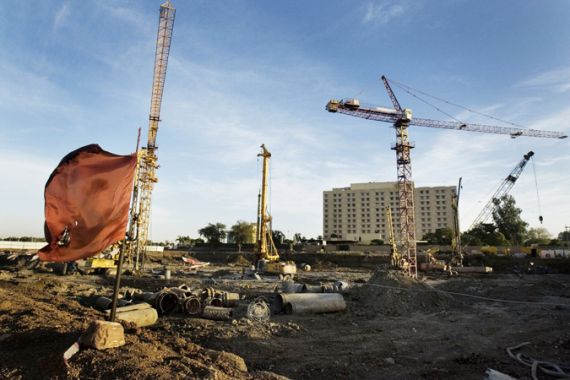Global south key to African economies
“South-south” cooperation will help both African countries and other emerging economies.

 |
| Investment from China, Malaysia and India is helping Sudan to build the $4bn Al Mogran project, a new commercial and financial hub in Khartoum – due to be complete within 15 years [GALLO/GETTY] |
People across the African continent share the same aspirations: decent employment, affordable access to basic services such as health and education, and opportunities to participate in shaping the future of their countries.
While Africa has experienced high economic growth and reduced poverty since the mid-nineties, one in two people in Sub-Saharan Africa still live on less than $1.25 a day. Too many men, women and children in most of the continent’s 53 countries are still not benefitting from economic and social progress.
Keep reading
list of 4 itemsOne of the biggest hurdles for athletes on the Olympic path: Money
Key takeaways from Xi Jinping’s Europe trip
When will EVs become mainstream in the US?
The key question is how to encourage people-centred growth, which creates jobs and opportunities to save and invest in the future.
This is the theme explored in the African Economic Outlook 2011, a report jointly written by the African Development Bank, the Organisation for Economic Cooperation and Development, the United Nations Development Programme and the United Nations Economic Commission for Africa.
|
Half of all people in Sub-Saharan Africa still live on less than $1.25 a day |
The report stresses that there is no roadmap for success in achieving people-centered growth. It encourages the continent to focus on “south-south cooperation” – cooperation among developing countries – as a catalyst for economic growth and human development.
Africa’s new partnerships with emerging economies like Brazil, China, India, Korea, Turkey and Indonesia offer immense opportunities. They present a broad range of policy ideas to inform such a growth process.
These countries have charted independent paths to development, devising home-grown solutions to address their own realities on the ground. Countries such as China and Vietnam have had astounding success in lifting millions of people out of poverty in just a few years. Brazil transformed its agriculture in a couple of decades, and is bringing hunger, poverty and inequality down.
These and other emerging economies have been able to bolster growth and trigger large-scale improvements in living standards, adopting and gradually expanding their own set of innovative policies.
By drawing lessons and inspiration from their successes, but also their shortcomings, many African countries can tailor their own institutions and policies to meet their development aspirations.
While traditional partners still represent the majority of Africa’s trade, aid and investment, emerging economies bring new flows of finance and expertise to the continent.
In 2009, China overtook the United States as Africa’s main trading partner. Two years earlier, for the first time, the share of Africa’s total trade with the group of developing countries – mainly emerging economies – surpassed Africa’s share of trade with the European Union.
To reap the full benefits of these partnerships, African policy-makers need to define the terms of their engagement with partners, based on clear development strategies. In doing so, they would advance their national interests and ensure that trade opportunities and investment flows deliver the development outcomes that matter to people: jobs, health, and education.
In addition, coordination at the regional and sub-regional levels would allow African countries to have more weight in negotiations with traditional and emerging economies, bargaining collectively to ensure these partnerships are geared toward achieving regional development priorities.
By the same token, traditional and emerging powers should consider the aspirations of their African counterparts to foster more systematic win-win outcomes.
Jean-Philippe Stinjs, Economist, Organisation for Economic Cooperation and Development;
Pedro Conceicao, Economist, United Nations Development Programme;
Desire Vencatachellum, Director, African Development Bank research department;
Emmanuel Nnadozie, Director, Economic Development and New Partnership for African Development Division, United Nations Economic Commission for Africa
The views expressed in this article are the authors’ own and do not necessarily reflect Al Jazeera’s editorial policy.